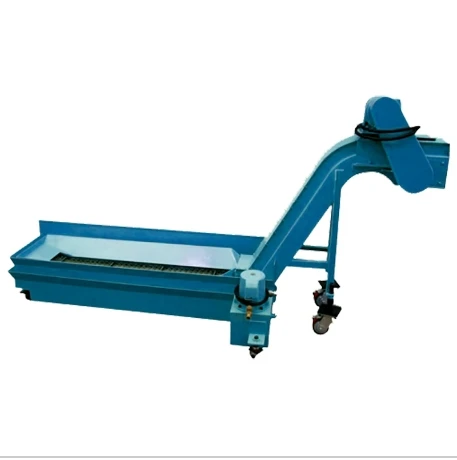chip conveyor
The Evolution and Importance of Chip Conveyors in Modern Manufacturing
In the world of modern manufacturing, efficiency and precision are paramount. One of the key components that facilitate these attributes is the chip conveyor. Serving a crucial role in the machining process, chip conveyors are designed to remove metal shavings and other debris generated during machining operations, thus enhancing productivity and ensuring machine longevity.
What are Chip Conveyors?
Chip conveyors are mechanical systems used primarily in CNC machining, metalworking, and other industrial applications where metal removal is prevalent. These conveyors transport chips — small metal fragments produced during machining processes like milling, turning, or grinding — from the processing area to a designated disposal or recycling point. The design of chip conveyors can vary widely, with options ranging from belt conveyors to screw conveyors and more sophisticated systems like magnetic or vacuum conveyors.
Types of Chip Conveyors
1. Belt Conveyors These are one of the most common types of chip conveyors. They utilize a continuous belt that moves over rollers to transport chips away from the machine. Belt conveyors are versatile and can handle various materials and chip types, making them suitable for general-purpose applications.
2. Screw Conveyors Also known as auger conveyors, these systems use a rotating helical screw to move chips along a trough. Screw conveyors are particularly effective for handling wet or slushy chips and are commonly found in environments where chip debris is mixed with coolant.
3. Magnetic Conveyors Designed for handling ferrous materials, magnetic conveyors use magnets to lift and transport metal chips. This type of conveyor is ideal for applications involving steel or iron, as it minimizes the risk of contamination from other materials.
4. Vacuum Conveyors These systems use suction to transport chips directly from the machining process to a collection point. Vacuum conveyors are beneficial in environments where space is limited or where it is necessary to prevent chips from falling on the floor.
Importance of Chip Conveyors
chip conveyor

Chip conveyors play an essential role in maintaining a clean and organized manufacturing environment. Here are several reasons why they are critical
1. Enhanced Machine Performance By efficiently removing chips from the machining process, chip conveyors help maintain optimal performance levels for CNC machines. Excessive chip buildup can lead to overheating and increased wear and tear, ultimately decreasing the lifespan of the machinery.
2. Workplace Safety A clean workspace is a safer workspace. Chip conveyors minimize the risk of slips, trips, and falls caused by loose chips on the factory floor. Additionally, they help prevent potential hazards associated with the handling of sharp metal fragments.
3. Operational Efficiency With the automated removal of chips, operators can focus on more critical tasks without the distraction of manual chip removal. This not only increases operational efficiency but also allows for higher production rates.
4. Environmental Impact Many manufacturers have adopted eco-friendly practices, and chip conveyors facilitate the recycling of metal shavings. By collecting and sorting chips, companies can recycle materials, reducing waste and lowering production costs.
5. Coolant Management In many machining operations, a coolant is used to reduce friction and heat. Chip conveyors play a crucial role in removing chips and debris from the coolant, ensuring that it remains effective for a longer duration.
Evolution and Future Trends
The design and technology of chip conveyors have evolved significantly over the years. Modern chip conveyors often incorporate advanced features such as automation, smart sensors, and IoT connectivity, allowing for real-time monitoring and management. As the manufacturing sector continues to adopt Industry 4.0 practices, the integration of chip conveyors with AI and machine learning for predictive maintenance and operational optimization is expected to become more prevalent.
Conclusion
In summary, chip conveyors are indispensable in today's manufacturing landscape. Their role in maintaining machine performance, ensuring workplace safety, and promoting efficient operations cannot be overstated. As technology continues to advance, chip conveyors will undoubtedly evolve, offering smarter and more efficient solutions that align with the ever-changing demands of the manufacturing industry. Emphasizing efficient chip removal will foster superior manufacturing environments, ultimately leading to increased productivity and sustainability in operations.








